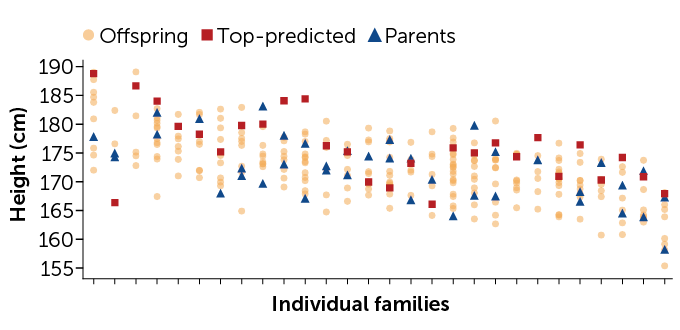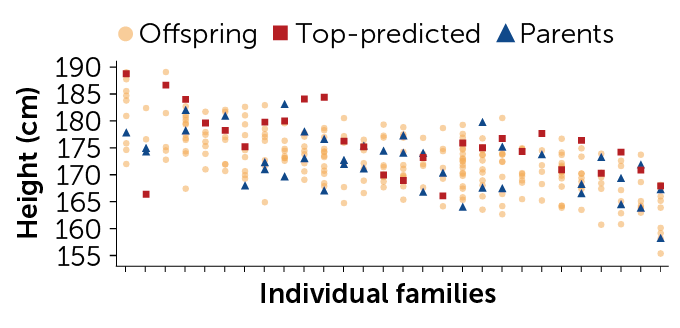Why screening DNA for ‘designer babies’ probably won’t work
Selecting embryos for height doesn’t necessarily lead to tall children

- More than 2 years ago
Picking embryos based on genetics might not give prospective parents the “designer baby” they’re after.
DNA predictions of height or IQ might help would-be parents select an embryo that would grow into a child who is, at most, only about three centimeters taller or about three IQ points smarter than an average embryo from the couple, researchers report November 21 in Cell. But offspring predicted by their DNA to be the tallest among siblings were actually the tallest in only seven of 28 real families, the study found. And in five of those families, the child predicted to be tallest was actually shorter than the average for the family.
Even if it were ethical to select embryos based on genetic propensity for height or intelligence, “the impact of doing so is likely to be modest — so modest that it’s not likely to be practically worth it,” says Amit Khera, a physician and geneticist at the Center for Genomics Medicine at Massachusetts General Hospital in Boston who was not involved in the new study.
For years, couples have been able to use genetic diagnosis to screen out embryos carrying a disease-causing DNA variant. The procedure, called preimplantation genetic diagnosis, or PGD, involves creating embryos through in vitro fertilization. Clinic staff remove a single cell from the embryo and test its DNA for genetic variants that cause cystic fibrosis, Tay-Sachs or other life-threatening diseases caused by defects in single genes.
Many diseases such as diabetes and heart disease, as well as traits like height and intelligence, are considered complex because they are caused in part by tiny effects of variants in hundreds or even thousands of genes (SN: 5/31/13; SN: 9/29/10) But researchers can boil down those tiny effects of multiple genes into one “polygenic” score (SN: 4/18/19). Khera was involved, for example, in compiling 6 million genetic variants into a risk score for heart disease.
Advances in this technology in recent years, however, have sparked debates about whether people should be allowed to use these scores to select embryos with complex traits, such as height or intelligence. Some people say that selecting for “enhancements,” gender preferences or other nonmedical traits smacks of eugenics, the practice of breeding humans toward some desired outcome. The term is now often associated with racism, genocide and forced sterilization campaigns. The findings in the new study bring a dose of reality to these discussions about designer babies and selecting embryos for reasons other than medical conditions.
“We wanted to use these numbers or these methods to make the debate more quantitative, more evidence-based,” says Shai Carmi, a statistical geneticist at the Braun School of Public Health of the Hebrew University of Jerusalem.
Carmi and colleagues used data from studies of longevity and schizophrenia to look at what might happen in embryo selection. Some people in the longevity study were real-world spouses, so the researchers simulated genetic profiles for the couples’ hypothetical offspring. The researchers also created virtual couples by pairing unrelated people and simulating the genetic makeup of those faux couples’ embryos. Polygenic scores predicting height or IQ were then calculated for the embryos.
Among 10 embryos, the one that the genetic scores suggested would be tallest was predicted to be only three centimeters taller than the average height predicted for all 10 embryos, the team found. Similarly, the highest intelligence polygenic score predicted the resulting child would be three IQ points smarter than the average for all 10 embryos. With only five embryos to choose from (a more realistic number based on numbers of embryos generated in fertility studies), the gains drop to about 2.5 centimeters and 2.5 IQ points, the researchers found.
That’s only the predicted result. To see whether the predictions would hold up in the real world, Carmi and colleagues looked at 28 large families, each with up to 20 children. In those families, the child predicted by genetic score to be the tallest was actually the tallest in only about a quarter of the families. In fact, the child predicted to be the tallest was actually about three centimeters shorter on average than the family’s tallest child, the researchers discovered.
Measuring up
Researchers compiled genetic scores that predict the height of each member of 28 large families (each column represents one family). The child whose DNA predicted they’d be the tallest (red squares) often were several centimeters shorter than one or more sibling (yellow circles). Parents’ heights are marked by blue triangles.
How DNA predicted the height of children in real families


The study “does add more data,” says Susanne Haga, a human geneticist at Duke University School of Medicine. But there’s too much variability in these complex traits to accurately predict an outcome just by looking at DNA. “There’s still a great deal of variability that’s not accounted for by the genes they were analyzing or simulating in their polygenic score. Therefore, you’re still going to see a wide distribution of height or IQ points.”
Differences in diet, lifestyle, exposure to pollution, culture, undiscovered genetic variants and other unknown factors can also influence how complex traits develop, Haga says. “We still have a ways to go to understand the genetic mechanisms behind these traits, and the fact that the environment plays such a critical role cannot be discounted,” she says.
Other researchers expressed concern that the study’s findings could be misunderstood or misrepresented to promote picking embryos for nonmedical traits.
In the new study, “the science is rigorous,” says Nicholas Katsanis, a human geneticist at the Ann & Robert Lurie Children’s Hospital of Chicago. But he worries it could encourage fertility clinics to offer genetic screening for height and IQ to entice would-be parents hoping to give their future children an edge, even though the study suggests that edge isn’t really predictable.
“The fundamental question should not be asked in the first place, because the idea that we’re going to do genetic screening for anything other than medically actionable items is the definition of eugenics,” Katsanis says. “That we’re even contemplating this is disturbing.”







